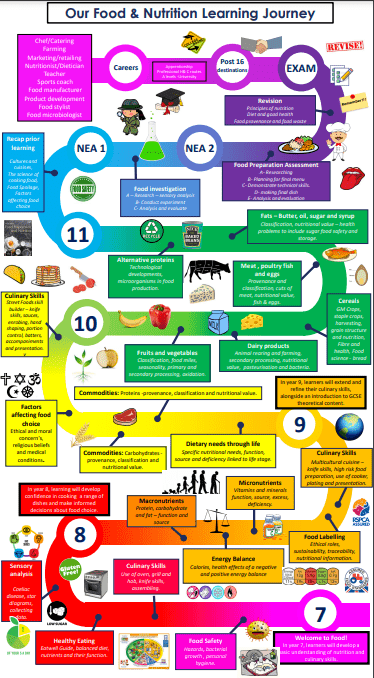 |
food and nutrition
Approach to Teaching
“Good food provision in schools has been shown to lead not only to healthier children, but to improved attainment.”
Henry Dimbleby and John Vincent, authors of The School Food Plan
The food and nutrient curriculum has a mixture of practical and theoretical lessons. Each year builds on pupils’ knowledge and understanding of cooking skills, nutrients, food science and cultural aspects surrounding food today.
Throughout the key stages, each project is designed to stretch and challenge pupils, whilst building on their ability to cook and eat healthy foods.
Key Stage 3 (Year 7-9)



Year 7 Healthy Eating
Design Brief:
More and more people are taking an interest in living a healthy lifestyle, this means learning what nutrients our body needs and eating a balanced diet. Your task is to design make a range of products that show healthy eating.
In this unit you will;
Year 8: Global Gastronomy
Design Brief:
Britain is a multicultural society. Our diet reflects this by the variety of dishes we cook at home or eat in restaurants. Design and make a range of products inspired by other countries.
In this unit you will;
Year 9: Nutrition & Me
Design Brief:
Now more than ever, understanding the key principles of nutrition is vital when living a fit and healthy lifestyle. This module will aim to teach you that food can be nutritious, exciting and delicious whilst introducing the basics GCSE food preparation.
In this unit you will;
Food & Nutrition Education
During food and nutrition lessons at St Edmunds Catholic School your child will be learning about healthy eating, cooking and where food comes from.
He/she will make up to 3 recipes/dishes during their Food Technology roundabout in Year 7,8 and 9. Students are expected to provide their own ingredients unless otherwise stated in the recipe booklet. The recipes have been carefully chosen to accommodate a variety of budgets, with an estimated average cost of £6-8 per year. Please contact us if you have any concerns or queries.
It is essential that we ensure that the food your child makes is as safe to eat as possible. An important aspect of food safety is temperature control and therefore it will be necessary that high risk ingredients (such as meat, fish and dairy products plus opened bottles, jars or tubes) are placed in the fridge in the food room before the start of the school day. High risk ingredients not placed in the fridge will not be used. Any finished dishes will be stored in the fridge, or in the food room, and should be collected at the end of the school day. Any dishes, spare ingredients or containers not collected after two days will be recycled or disposed.
Personal hygiene is also an important consideration and therefore your child must not wear jewellery, watches or nail varnish, they must tie their hair back and must wear a clean apron. In addition, your child will be actively discouraged from eating during a practical lesson unless it is to taste dishes made.
Finally, food lessons will involve your child using and tasting a number of ingredients. It is essential for me to be aware of any allergies or intolerances he/she may have. Therefore, I would be grateful if you could inform the school of any known severe allergies.
I appreciate your assistance with the above and look forward to teaching your son/daughter and hope to enthuse him/her about good food and healthier eating.
Resources for Autumn 2023 Term 1
| Name |
|---|
Resources Autumn 2023 Term 2
| Name |
|---|
KS3 Resources
| Name |
|---|
Key Stage 4 (Year 10-11)
GCSE Food and Nutrition Examination Board - Eduqas (Part of WJEC).
Assessment
- NEA 1: (Non Exam Assessment) Food Science Investigation = 15%
- NEA 2: (Non Exam Assessment) Practical making three dish meal, with 15 page (30 side) written research, planning and evaluation. = 35%
- Written Exam = 50%
What will you learn?
- Learn in detail about nutrient and their functions through practical activities and experimental work
- Learn about healthy eating and related health issues
- Learn about Food Science
- Learn about functions of the ingredients in a food product so that you can modify recipes and create new food products
-
Learn about the environmental issues related to food
Who Is This Course For?
- You enjoy being creative
- You enjoy using practical skills and learn by doing
- You want to make a wide range of food products
- You want to learn more about diet and health
-
You want to learn where food is grown and what affects people’s
What Happens When You Finish? (Career Pathway)
- Level 3 qualifications in Food Science and Nutrition.
- Degree – Food Technology, Food and Nutrition, Food Marketing Management, Food Safety and Quality Management.
- Apprenticeships – Food Manufacturing, Hospitality and Catering.
- Possible Careers – Catering, Chef, Product Development, Food Production, Marketing, Nursing, Teaching, Social Work, Dietician, Paediatrician, Environmental Health Officer.
KS4 Food Tech Resources
| Name |
|---|




















